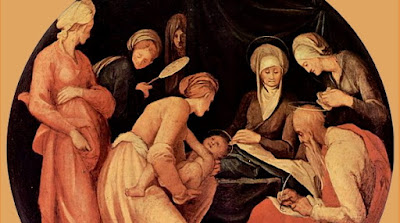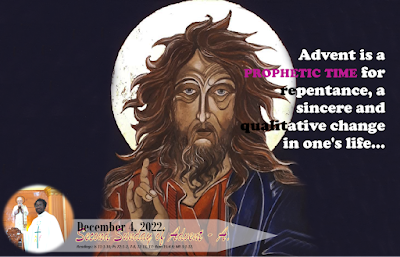BORN FOR A SPECIFIC PURPOSE.
June 24, 2021
Solemnity of the Nativity of Saint John the Baptist.
“A man was sent from God, whose name was John. He came to
testify to the light, to prepare a people fit for the Lord.” (Jn 1, 6-7; Lk 1,
17)
A Ganda proverb says: “Parents give birth to the body of
their children, but not always to their characters.” And a Bajan proverb adds:
“There is no name which cannot distinguish a child.”
The Entrance Antiphon opening us to today's solemnity leads
us to the discovery of the man named John, the Baptist and the greatest
Prophet. He is a man born with a mission and for a purpose. Not only the
circumstances of his birth are mysterious and providential, but his whole life
will be a work of God's compassion and providential presence among his people.
We are today six months before Christmas, and the tradition
of the Church, based on the biblical reports, holds that the precursor of the
Messiah was born six months before him. In his birth, as well as in his
mission, John comes before the Lord to prepare his way. As sings the old man
Zechariah in his thanksgiving canticle, this child born to us today,
"shall be called the prophet of the Most High; for he will go before the
Lord to prepare his way, to give his people knowledge of salvation by the
forgiveness of their sins." (Lk 1:68-79). In this song, not only the mystery
that surrounds his birth is exposed, but the meaning of his life is clearly
revealed. John’s birth, as we said, is for a purpose: to bring the divine
consolation to Elizabeth and Zechariah, and greater consolation to the whole
Israel. For, it presages God's visitation to his people to set them free.
Who is John the Baptist? Here is the answer the Catechism
gives: “John the Baptist is "more than a prophet." In him, the Holy
Spirit concludes his speaking through the prophets. John completes the cycle of
prophets begun by Elijah. He proclaims the imminence of the consolation of
Israel; he is the "voice" of the Consoler who is coming. As the
Spirit of truth will also do, John "came to bear witness to the
light." In John's sight, the Spirit thus brings to completion the careful
search of the prophets and fulfills the longing of the angels. "He on whom
you see the Spirit descend and remain, this is he who baptizes with the Holy
Spirit. And I have seen and have borne witness that this is the Son of God...
Behold, the Lamb of God."” CCC. 719.
In the first reading, the Prophecy of Isaiah, the
explanation of Isaiah’s own vocation could be applied to John. He is one called
from birth, from his mother's womb with a name given beforehand to become a
light to the nations. His mission is to bring back God's people to him, to
reconcile rebellious people to their God.
The book of the Acts describes John as a herald. It says
that John heralded the coming of the Lord by proclaiming a baptism of
repentance. That was actually the mission and the whole life of this Prophet.
In the Gospel, the narrative of the birth and name's giving
of John proves God's glorious work. The Lord God has shown so much kindness to
Elizabeth and Zechariah her husband. In their old age, he gave them a son for
their consolation. What then could be the name of that son, if not something
recalling God's glorious work. While relatives and neighbors were arguing about
the name to be given to the newborn, unanimously, though without previous
concertation, the couple conveyed to call him John, the name given by the Angel
at the annunciation of his conception (Luke 1:13).





Comments
Post a Comment